The english language
The english language
The following texts are the property of their respective authors and we thank them for giving us the opportunity to share for free to students, teachers and users of the Web their texts will used only for illustrative educational and scientific purposes only.
The English Language
English belongs to the Indo-European family of languages.
A family of languages is a group of languages which have enough in common in their grammar, sound structure and vocabulary to support the belief that they are all divergent variants of the same original language.
Most languages of modern Europe descend from a hypothetical Indo-European language, spoken some five to six thousand years ago in north-central Europe.
Non Indo-European languages of Europe and vicinity include:
Basque- The sole surviving relic of western Europe's pre-Indo-European past.
Etruscan- An extinct non IE language of Italy.
Finnish and Estonian- belong to the Finno-Ugric language group of northeastern Europe; the IE peoples didn't get to this part of Europe.
Hungarian-Distantly related to Finnish; spoken by descendants of North Asian invaders from the ninth century AD. Several non-IE peoples invaded Europe after the fall of Rome, but only the Hungarians stayed and preserved their language.
Georgian-a language isolate spoken by a few million people north of Turkey.
Turkish, Arabic, and Hebrew are important non Indo-European of Southwest Asia.
Today, roughly half the world's population speak an Indo-European language. Most of the world's major languages are IE (except: Chinese, Arabic, Japanese, and Malay-Indonesian).
Indo-European Migrations
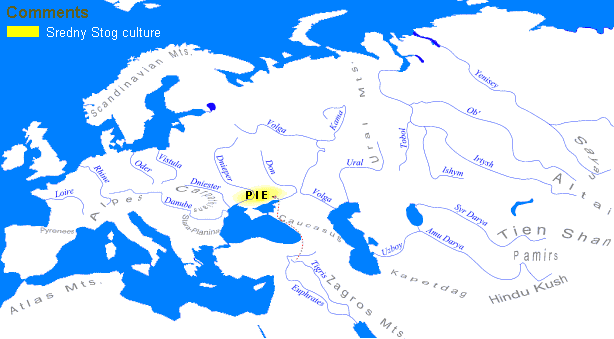
4500BC -- Eneolith -- 3500BC -- Early Bronze -- 2500BC -- Middle Bronze -- 1800BC -- Late Bronze -- 1200 BC
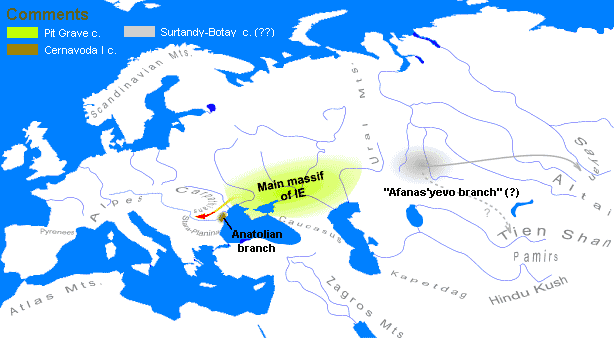
4500BC -- Eneolith -- 3500BC -- Early Bronze -- 2500BC -- Middle Bronze -- 1800BC -- Late Bronze -- 1200 BC
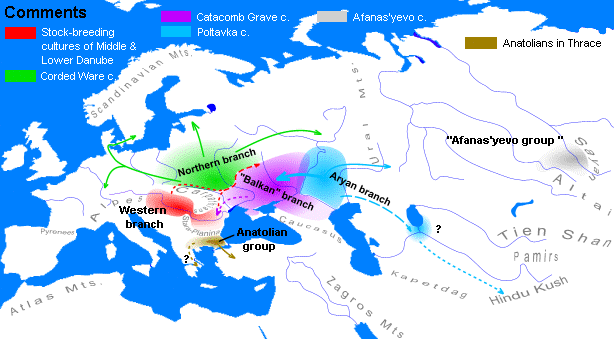
4500BC -- Eneolith -- 3500BC -- Early Bronze -- 2500BC -- Middle Bronze -- 1800BC -- Late Bronze -- 1200 BC
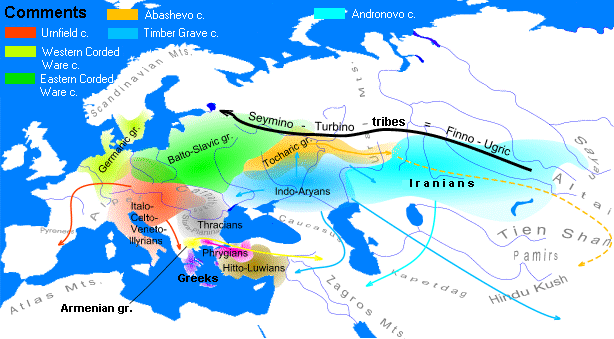
4500BC -- Eneolith -- 3500BC -- Early Bronze -- 2500BC -- Middle Bronze -- 1800BC -- Late Bronze -- 1200 BC
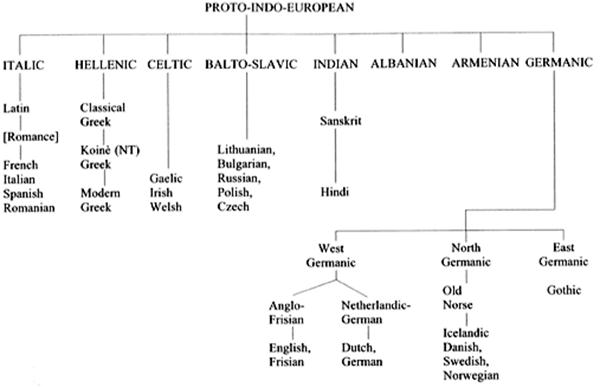
There are eight principal language families within the larger Indo-European family:
- Indo-Iranian
- Hellenic
- Italic
- Celtic
- Balto-Slavic
- Germanic
- Armenian
- Albanian
The Germanic languages are a group of related languages that constitute a branch of the Indo-European (IE) language family. The common ancestor of all the languages in this branch is Proto-Germanic, spoken in approximately the mid-1st millennium BC in Iron Age northern Europe.
Germanic is divided into three sub-families:
- East Germanic
Gothic (extinct) is an East Germanic language spoken by the Goths, who originally lived in southern Scandinavia but migrated to eastern Europe and then to southern and southwestern Europe. The language is especially important for the study of the history of the Germanic language family because its records, except for a few scattered runic inscriptions, antedate those of the other Germanic languages by about four centuries. The earliest extant document in Gothic preserves part of a translation of the Bible made in the IV Century AD by Ulfilas, a Gothic bishop.
- North Germanic
Icelandic, Faroese, Norwegian (West Norse), Swedish and Danish (East Norse)
- West Germanic
The West Germanic languages constitute the largest of the three traditional branches of the Germanic family of languages and include languages such as English, Dutch and Afrikaans, German, the Frisian languages, as well as Yiddish.
Stages of word borrowing in English
The English people have borrowed words from their conquerors and from the people they conquered. Each of the political events in the history of English speakers has left its mark on the English language. Here is a brief summary of the most influential events:
- Continental Germanic period (before c. 500 B.C)
- Old English period (c. 500 - 1100)
- Middle English period (c. 1100 - 1500)
- Modern English (c. 1500 - Present)
Continental Germanic period (before c. 500 B.C)
English evolved from the dialects of Germanic speakers (the Angles, Saxons, and Jutes) who colonized England about 500 A.D. These speakers had already borrowed some Latin words before they ever came to England. These very old borrowings have become quite Anglicized and often look like native words. Some examples are:
kitchen, church, sack, pepper, street
Old English period (c. 500 - 1100)
When the Angles, Saxons, and Jutes arrived in England, they brought with them their Germanic dialects. These formed the basic word stock of the English language.
About 600 A.D., Christianity was established in England. This resulted in many Latin words, especially ecclesiastical terms, being borrowed, as well as words which were necessary to understand Bible stories. Some examples are:
circle, comet, martyr
Later in this period, the Angle and Saxon colonists were pushed farther inland by Vikings who invaded the east coast of England. The Vikings settled along the coast, introducing many words from their Scandinavian languages into the original dialects. The English speakers sometimes replaced their own words, even words such as pronouns, with Scandinavian equivalents. Some examples are:
anger, cake, call, clumsy, doze, egg, fellow, get, give, hale, hit, husband, kick, kill, law, low, rag, raise, root, scorch, score, scowl, scrape, scrub, seat, skill, skin, skirt, sky, sly, take, they, them, their, thrall, thrust, ugly, want, window, wing
Beowulf is an Old English heroic epic poem of unknown authorship, dating as recorded in the Nowell Codex manuscript from between the 8th to the early 11th century, and relates events described as having occurred in what is now Denmark and Sweden. It is considered one of the most important works of Anglo-Saxon literature.
Beowulf – The Prologue
Interlinear translation
1 Hwæt. We Gardena in geardagum,
LO, praise of the prowess of people-kings
2 þeodcyninga, þrym gefrunon,
of spear-armed Danes, in days long sped,
3 hu ða æþelingas ellen fremedon.
we have heard, and what honor the athelings won!
4 Oft Scyld Scefing sceaþena/ þreatum,
Oft Scyld the Scefing from squadroned foes,
5 monegum mægþum, meodosetla ofteah,
from many a tribe, the mead-bench tore,
6 egsode eorlas.
awing the earls
Middle English period (c. 1100 - 1500)
The French-derived vocabulary is perhaps the most lasting result of the Normans' conquest of England in 1066 A.D. English speakers often borrowed French words to replace English words for the same thing because the French words had higher status and sounded more educated. Compare the following sets:
Borrowed from French |
poultry, mutton, venison |
Anglo-Saxon equivalent |
chicken, sheep, deer |
In some cases, Anglo-Saxon words were considered vulgar, while their French or Latin-derived equivalents were acceptable even in polite society. This status (or register) difference between French-derived and Anglo-Saxon derived words remains today.
Here are examples of other French borrowings:
Government |
Attorney, bailiff, chancellor, chattel, country, court, crime, defendant, evidence, government, jail, judge, jury, larceny, noble, parliament, plaintiff, plea, prison, revenue, state, tax, verdict |
Church |
Abbot, chaplain, chapter, clergy, friar, prayer, preach, priest, religion, sacrament, saint, sermon |
Nobility |
Noble, royal, baron, count, duke, marquis, prince, viscount |
Military |
army, artillery, battle, captain, company, corporal, defense, enemy, marine, navy, sergeant, soldier |
Foods and Cooking |
beef, boil, broil, butcher, dine, fry, mutton, pork, roast, salmon, stew, veal |
Art, culture and luxury items |
art, bracelet, claret, clarinet, dance, diamond, fashion, fur, jewel, oboe, painting, pendant, satin, ruby, sculpture |
The Prologe of the Wyves Tale of Bathe
The Wife of Bath's Prologue
(an interlinear translation from The Canterbury Tales
Geoffrey Chaucer ca.1343-1400)
1 Experience, though noon auctoritee
Experience, though no written authority
2 Were in this world, is right ynogh for me
Were in this world, is good enough for me
3 To speke of wo that is in mariage;
To speak of the woe that is in marriage;
4 For, lordynges, sith I twelve yeer was of age,
For, gentlemen, since I was twelve years of age,
5 Thonked be God that is eterne on lyve,
Thanked be God who is eternally alive,
6 Housbondes at chirche dore I have had fyve --
I have had five husbands at the church door --
7 If I so ofte myghte have ywedded bee --
If I so often might have been wedded --
8 And alle were worthy men in hir degree.
And all were worthy men in their way.
9 But me was toold, certeyn, nat longe agoon is,
But to me it was told, certainly, it is not long ago,
10 That sith that Crist ne wente nevere but onis
That since Christ went never but once
11 To weddyng, in the Cane of Galilee,
To a wedding, in the Cana of Galilee,
12 That by the same ensample taughte he me
That by that same example he taught me
13 That I ne sholde wedded be but ones.
That I should be wedded but once.
Modern English (c. 1500 - Present)
The Renaissance and later developments in science and technology led to massive borrowing from Latin and Greek.
During the 19th century, due to the expansion of the British Empire, English speakers borrowed words from hundreds of the different languages. They typically only borrowed words for things that were new to them, such as local foods, plants, animals, tools, and weather phenomena. Some examples are:
Hindi |
bangle, bungalow, chintz, cot, cummerbund, dungaree, jamboree, juggernaut, jungle, loot, pajamas, shampoo, thug |
Arabic |
Assassin, bazaar, caravan, emir, gazelle, giraffe, harem, hashish, lute, minaret, mosque, myrrh, sirocco, sultan |
African languages |
banana, banjo, chigger, goober, gorilla, gumbo, jazz, jitters, voodoo, yam, zebra, zombie |
American Indian languages |
Avocado, cannibal, canoe, chipmunk, chocolate, chilli, hammock, hominy, hurricane, maize, moccasin, moose, pecan, possum, potato, skunk, squash, teepee, tobacco, toboggan, tomahawk, tomato, wigwam, woodchuck |
Australia |
Boomerang, kangaroo |
Indo-European Language Families that have contributed words to English |
||||
Celtic: |
Latin/Romance: |
Germanic: |
Greek |
Indo-Iranian: |
The Great Vowel Shift
One of the defining features distinguishing Modern English from Middle English was the Great Vowel Shift (GVS), which occurred gradually over the course of the fifteenth and sixteenth centuries.
The Great Vowel Shift was a gradual process which began in Chaucer's time (early 15th Century) and was continuing through the time of Shakespeare (early 17th Century). Speakers of English gradually changed the parts of their mouth used to articulate the long vowels. Simply put, the articulation point moved upward in the mouth. The vowels, which began being pronounced at the top, could not be moved farther up; they became diphthongs1. The upshot has been that the Anglo-Saxons lived (like the Scottish still do) in a 'hoose', and the English live in a 'house'; the Anglo-Saxons (like the Scottish) milked a 'coo', and the English milk a 'cow'; an Anglo-Saxon had a 'gode' day and the English have a 'good' one; an Anglo-Saxon had 'feef' fingers on each hand and the English have 'five'; they wore 'boats' on their 'fate' while the English wear 'boots' on our 'feet'. The Great Vowel Shift is still continuing today in regional dialects; many speakers are now trying to move the topmost articulation points farther up, producing new diphthongs.
When we talk about the GVS, we usually talk about it happening in eight steps. It is very important to remember, however, that each step did not happen overnight. At any given time, people of different ages and from different regions would have different pronunciations of the same word. Older, more conservative speakers would retain one pronunciation while younger, more advanced speakers were moving to a new one; some people would be able to pronounce the same word two or more different ways. The same thing happens today, of course: I can pronounce the word "route" to rhyme with "boot" or with "out" and may switch from one pronunciation to another in the midst of a conversation. |

The principal changes are roughly as follows. However, exceptions occur, the transitions were not always complete, and there were sometimes accompanying changes in orthography:
- Middle English [aː] (ā) fronted to [æː] and then raised to [ɛː], [eː] and in many dialects diphthongised in Modern English to [eɪ] (as in make). Since Old English ā had mutated to [ɔː] in Middle English, Old English ā does not correspond to the Modern English diphthong [eɪ].
- Middle English [ɛː] raised to [eː] and then to modern English [iː] (as in beak).
- Middle English [eː] raised to Modern English [iː] (as in feet).
- Middle English [iː] diphthongised to [ɪi], which was most likely followed by [əɪ] and finally Modern English [aɪ] (as in mice).
- Middle English [ɔː] raised to [oː], and in the eighteenth century this became Modern English [oʊ] or [əʊ] (as in boat).
- Middle English [oː] raised to Modern English [uː] (as in boot).
- Middle English [uː] was diphthongised in most environments to [ʊu], and this was followed by [əʊ], and then Modern English [aʊ] (as in mouse) in the eighteenth century. Before labial consonats, this shift did not occur, and [uː] remains as in room and droop).
This means that the vowel in the English word date was in Middle English pronounced [aː] (similar to modern dart); the vowel in feet was [eː] (similar to modern fate); the vowel in wipe was [iː] (similar to modern weep); the vowel in boot was [oː] (similar to modern boat); and the vowel in house was [uː] (similar to modern whose).
The effects of the shift were not entirely uniform, and differences in degree of vowel shifting can sometimes be detected in regional dialects both in written and spoken English, for example in the speech of much of Scotland.
Not all words underwent certain phases of the Great Vowel Shift. ea in particular did not take the step to [iː] in several words, such as great, break, steak, swear and bear. Other examples are father, which failed to become [ɛː], and broad, which failed to become [oː].
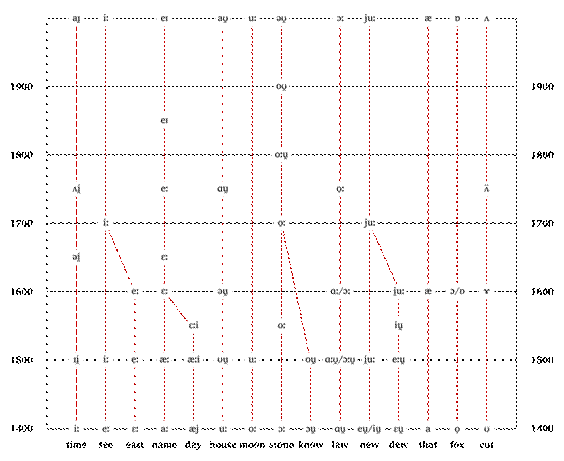
There are theories for why the Great Vowel Shift has occurred. Two models of the pattern of vowel change are the 'pull theory' in which the upper vowels moved first and 'pulled' the lower ones along, and the 'push theory' in which the lower vowels moved forward and up, pushing the others ahead. Neither theory gives us an answer to why the shift happened, and the actual shifting was so complicated by regional variation that it will be difficult to ever sort out more than a general pattern of shifting. The regional variation of the shift has lead to a multitude of vowel pronunciations which are neither standard English nor standard Continental such as this anecdote:
Boy in North-East England is sitting by a river, crying. Passer by asks what's up.
Boy says 'Me mate fell in the water'.
'Oh - that's terrible, how did it happen?'.
'Fell right out of my sandwich, into the water!'
In the above example are vowels that have shifted beyond the strict definition of the Great Vowel Shift. This is a demonstration that the English language is still evolving in wonderful (and confusing) ways. In addition, the reconstruction of the sounds is based on texts, which are rarely a perfect means of recording sound. The printing press further complicated this problem, as it tended to fix spelling in the 15th and 16th Centuries, before the sounds of speech had finished shifting (if they ever did finish). Today, English speakers speak with 21st Century pronunciation, but they write their words in a 15th Century form.
A Chronology of the English Language
55 BC
Roman invasion of Britain under Julius Caesar
43 AD
Roman invasion and occupation under Emperor Claudius.
Beginning of Roman rule of Britain
436
Roman withdrawal from Britain complete
449
Anglo-Saxon settlement of Britain begins
450-480
Earliest Old English inscriptions date from this period
597
St. Augustine arrives in Britain. Beginning of Christian conversion
792
Viking raids and settlements begin
865
The Danes occupy Northumbria
871
Alfred becomes king of Wessex. He has Latin works translated into
English and begins practice of English prose. The Anglo-Saxon
Chronicle is begun
911
Charles II of France grants Normandy to the Viking chief Hrolf the
Ganger. The beginning of Norman French
1066
The Norman conquest
c. 1150
The oldest surviving manuscripts of Middle English date from this
period
1348
English replaces Latin as the medium of instruction in schools,
other than Oxford and Cambridge which retain Latin
1362
The Statute of Pleading replaces French with English as the
language of law. Records continue to be kept in Latin. English is
used in Parliament for the first time
1384
Wyclif publishes his English translation of the Bible
c. 1388
Chaucer begins The Canterbury Tales
c. 1400
The Great Vowel Shift begins
1476
William Caxton establishes the first English printing press
1564
Shakespeare born
1603
Union of the English and Scottish crowns under James the I (VI of
Scotland)
1604
Robert Cawdrey publishes the first English dictionary, Table
Alphabeticall
1607
Jamestown, the first permanent English settlement in the New
World, established
1611
The Authorized, or King James Version, of the Bible is published
1616
Death of Shakespeare
1623
Shakespeare's First Folio is published
1702
Publication of the first daily, English-language newspaper, The
Daily Courant, in London
1755
Samuel Johnson publishes his dictionary
1828
Noah Webster publishes his dictionary
1922
British Broadcasting Company founded
1928
The Oxford English Dictionary is published
Major Periods of Borrowing in English History
Date |
Events |
Language Influence |
|
Before 500 A.D. |
Pre-English |
||
~4000 B.C. |
Proto-Indo-European |
|
|
|
|
|
|
~2000 B.C. - 500 A.D. |
Continental Germanic |
|
|
Latin borrowings (e.g. church, street, wall) |
|
||
|
|
|
|
500 - 1100 A.D. |
Old English |
||
00 |
Angles and Saxons invade England |
Celtic borrowings (few ordinary words, but many place and river names, e.g. London, Thames, Devon) |
|
600 |
Christianity introduced to England |
Latin borrowings (e.g. apostle, city, master, paper) |
|
800 - 1000 |
Viking Invasions |
Scandinavian borrowings (e.g. anger, cake, egg, husband, kick, kill) |
|
|
|
|
|
1100 A.D. - 1500 A.D. |
Middle English |
||
1066 |
Norman Conquest |
French borrowings Law and government (e.g. attorney, judge), church (abbot, saint), nobility (baron, prince, royal), military (army, battle), cooking (beef, boil, dine, mutton, veal) |
|
|
|
|
|
1500 A.D. – Present |
Present Day English |
||
13th - 16th century |
Renaissance and Scientific innovation |
Greek borrowings (many of these via Latin) e.g. atmosphere, climax, skeleton |
|
Latin borrowings e.g. abdomen, anatomy, meditate |
|
||
16th - 19th C |
English colonialism |
American Indian languages (e.g. avocado, chocolate, hammock, maize) African languages (e.g. banana, yam, zebra), Hindi (e.g. bungalow, jungle, pyjamas, thug) |
|
BORROWING (definition)
[Before 10c: from Old English borgian to borrow, lend, from borg a pledge]. (1) Taking a word or phrase from one language into another, or from one variety of a language into another. (2) The item so taken, such as arpeggio from Italian into English, and schlock from Yiddish into AmE, then into BrE. Borrowing is a major aspect of language change.
Patterns of borrowing
Any language, under appropriate circumstances, borrows lexical material from other languages, usually absorbing the exotic items or translating them into native equivalents. Some languages borrow more than others, and borrow more from some sources than others. English has borrowed massively from French, Latin, and Greek, significantly from Italian, Spanish, German, Danish, and Dutch, and to varying degrees from every other language with which it has come in contact. The Cannon corpus of 13,683 new English words shows that this process continues unabated; the 1,029 transfers listed in the corpus entered English from 84 languages (1987 - 9) as follows: French 25%, Spanish and Japanese both 8%, Italian 6.3%, Latin 6.1%, Greek 6%, German 5.5%, and 77 languages contributed 1 - 39 items each. Here, only the Japanese element breaks the traditional pattern, in which European languages predominate.
Reasons for Borrowing
The preconditions for borrowing are: (1) Close contact in especially multilingual situations, making the mixing of elements from different languages more or less commonplace. (2) The domination of some languages by others (for cultural, economic, political, religious, or other reasons), so that material flows 'down' from those 'high' languages into 'lower' vernaculars. (3) A sense of need, users of one language drawing material from another for such purposes as education and technology. (4) Prestige associated with using words from another language. (5) A mix of some or all of these. Individuals may use an exotic expression because it seems to them to be the most suitable term available, the only possible term (with no equivalent in any other language), or the most impressive term. Much of the vocabulary of French entered English in the Middle Ages because French was the language of political and social power and the channel through which mainland European culture reached Britain. Much of the vocabulary of Latin entered English during the Renaissance (directly or via French) because Latin was the European language of religion, education, and learning.
Some Borrowings into English
In the following sections, is a selection of languages from which at various times (see previous sections) and in various ways English has borrowed.
Europe: the Germanic languages
(1) Danish: smørrebrød/smorrebrod. (2) Dutch, including Flemish and Low German: bluff, boor, boss, brandy, bully, bumpkin, clamp, clipper, coleslaw, cookie, cruise, dapper, derrick, dope, drill, drum, easel, frolic, golf, grime, hunk, kink, landscape, loiter, poppycock, rant, runt, scow, skipper, sled, sledge, sleigh, slim, smack, smuggle, snap, snoop, splint, spook, stoop, yacht, yawl. (3) German: blitz(krieg), dachshund, fahrenheit, flak, frankfurter, glockenspiel, gneiss, hamburger, hamster, kaffeeklatsch, kindergarten, kitsch, leberwurst, leitmotiv, nix, pretzel, quartz, realpolitik, sauerkraut, schadenfreude, schmaltz, schnitzel, schwa, strafe, waltz, weltanschauung, weltgeist, yodel, zeitgeist. (4) Icelandic: auk, eider, geyser, saga. (5) Norse: anger, balderdash, bing, bleak, blether, blink, bloom, blunder, blur, call, clamber, creek, crook, die, dirt, dowdy, doze, dregs, egg, fellow, flat, flaunt, flaw, fleck, flimsy, gasp, gaunt, gaze, girth, glint, glitter, gloat, happen, harsh, inkling, kick, kilt, law, leg, loan, meek, midden, muck, muggy, nasty, nudge, oaf, odd, raise, root, scalp, scant, scowl, seat, skerry, skewer, skid, skill, skin, skull, sky, sniff, snub, squall, squeal, take, they, thrall, thrift, thrust, ugly, vole, want, weak, window. (6) Norwegian: fjord/fiord, floe, kraken, krill, lemming, ski, slalom. (7) Scots, in English at large: balmoral, burn, canny, carfuffle, collie, cosy, eerie, eldritch, forebear, glamour, glengarry, gloaming, glower, gumption, guddle, lilt, pony, raid, rampage, uncanny, wee, weird, wizened, wraith; mainly in Scotland: ashet, bogle, bonnie, burn, cleg, dreich, dwam, fornent, furth of, glaikit, glaur, hochmagandy, howf, leal, lowp, outwith, scunner, speir, stot, thole, trauchle. (8) Swedish: glogg, ombudsman, smörgaåsbord/smorgasbord, tungsten. (9) Yiddish: chutzpah, shlemiel, shlep, shlock, schmaltzy.
Europe: Greek
(1) Inflectional endings retained but spelt in the Latin style: abiogenesis, aegis, analysis, anemone, antithesis, automaton, charisma, cinema, crisis, criterion, cytokinesis, diagnosis, dogma, drama, electron, enigma, genesis, gnosis, hoi polloi, kerygma, lalophobia, magma, osteoporosis, phenomenon, photon, rhinoceros, rhododendron, stigma, synthesis, thesis. (2) With Latin endings: brontosaurus, chrysanthemum, diplodocus, hippopotamus, Pliohippus. (3) Endings dropped or adapted: agnostic, agnosticism, alphabet, alphabetic, analyst, analytic, anthocyanin, astrobleme, atheism, automatic, biologist, biology, blasphemy, charismatic, chemotherapy, chronobiology, cinematography, critic, criticism, dinosaur, dogmatic, dogmatism, dramatic, dramatist, electric, electronic, enigmatic, epistemic, epistemology, gene, genetic, herpetology, narcolepsy, odyssey, oligarchy, patriarch, phenomenology, photograph, pterodactyl, sympathomimetic. (4) Modern: bouzouki, moussaka, ouzo, rebetika, sirtaki, souvlaki.
Europe: Latin
(1) Inflectional endings retained: addendum, albumen, apex, area, bacterium/bacteria, cactus, calix, camera, cancer, circus, colossus, complex, datum/data, discus, equilibrium, fauna, flora, formula, fungus, genius, genus, homunculus, honorarium, inertia, interim, latex, locus, medium/media, memorandum, momentum, onus, opera, ovum, pauper, pendulum, peninsula, propaganda, radium, referendum, series, simile, simplex, status, stimulus, terminus, vertigo, victor. (2) Actual inflected Latin verbs used as nouns: audio, audit, caveat, exeunt, fiat, floruit, imprimatur, mandamus, video. (3) Fixed phrases: ad hoc, a posteriori, de facto, de jure, extempore, (ex) post facto, post mortem, quid pro quo, sine die. (4) Binomials: Homo sapiens, Pax Britannica, miles gloriosus, gluteus maximus. (5) Endings dropped or adapted, often through French: add, addition, additive, agent, agentive, aqueduct, candle, colo(u)r, colossal, consider, contemplate, decide, decision, erupt, eruption, general, generic, hono(u)r, hono(u)rable, honorary, igneous, ignite, ignition, ignoble, illiteracy, illiterate, immoral, immortality, ingenious, ingenuity, literacy, literate, literature, meditate, meditation, meditative, memorable, memory, moment, momentary, momentous, moral, morality, nobility, noble, pendulous, peninsular, revise, revision, sex, similar, similarity, temple.
Europe: the Romance languages
(1) French, Old: allow, beauty, beef, brush, castle, chivalry, choice, cloister, conquest, constraint, court, defeat, destroy, dinner, forest, frail, garden, govern, honest, hostel, interest, judge, loyal, marvel, mutton, paste, place, poison, pork, priest, push, quarter, quest, royal, stuff, sure, tempest, ticket, trick; Modern: aperitif/apéritif, apresski/après-ski, avant-garde, bidet, bourgeois(ie), brasserie, brassiere/brassière, cafe/café, camouflage, canard, chateau/château, chef, chevalier, coup de grace/grâce, coup d'etat/état, croissant, cuisine, debacle/débacle/débâcle, debut/début, dessert, elite/élite, esprit de corps, etiquette, fiance(e)/fiancé(e), fricassee/fricassée, frisson, garage, gourmand, gourmet, hors d'oeuvre, hotel, joie de vivre, liaison, limousine, lingerie, marionette, morale, nee/née, objet d'art, parole, pastiche, patisserie/pâtisserie, petite, pirouette, prestige, regime/régime, risque/risqué, silhouette, souvenir, toilette, vignette, voyeur, (2) Italian, through French: balcony, battalion, brigade, charlatan, design, frigate, granite, squadron; direct: alto, arpeggio, bordello, broccoli, cameo, canto, confetti, contralto, cupola, ghetto, graffiti, grotto, imbroglio, lasagne, libretto, mozzarella, pasta, piano(forte), piazza, piccolo, pizza, pizzeria, pizzicato, ravioli, risotto, sonata, seraglio, soprano, spaghetti, staccato, stanza, studio, tagliatelle, vermicelli. (3) Occitan/Provençal, usually through French: ballad, beret, cocoon, funnel, nutmeg, troubadour. (4) Portuguese: albino, caste, marmalade, molasses, palaver. (5) Spanish, adapted: alligator, anchovy, barricade, cask, cedilla, galleon, grenade, hoosegow, lariat, ranch, renegade, sherry, stampede, stevedore, vamoose; direct: adobe, armada, armadillo, borracho, bravado, chili, chinchilla, embargo, guerrilla, hacienda, mosquito, mulatto, negro, peccadillo, pinto, pronto, sarsaparilla, silo, sombrero, vigilante.
Source: http://www.lumsa.it/LUMSA/Portals/docenti/Pugliese/LINGUA%20INGLESE%20MATERIALE%20(1).doc
Author : not indicated on the document source
The english language
Visita la nostra pagina principale
The english language
Disclaimer
This site is not a news organization and is updated without any periodicity, solely on the basis of availability of material, so is not an editorial product subject to discipline in art. 1, paragraph III of Law No. 62, 7.03.2001. The summaries, notes, lyrics and quotes contained on this site are available free of charge to students, researchers, professors, technicians with illustrative educational and scientific purposes with the concept of fair use and purpose of compliance with EU Directive 2001/29 / EC and the Law Article 633. Dlg 70 and 68. The site is managed and coordinated by the author only for informational and educational purposes. While considering the reliable sources used, the author of this site does not guarantee the accuracy and integrity of information and therefore accepts no responsibility for any problems or damage caused by errors or omissions, if such errors or omissions result from negligence , accident or other cause. All notes, quotes the texts and images are property of their respective authors and production companies that own the rights, if the beneficiaries were considered damaged by the inclusion of these files on this site or had been inadvertently inserted images, information, text or other copyrighted material will be immediately removed and or it will be referred to the source from simple message to the e-mail address indicated on the contact page.
The mission of this site is the progress of science and useful arts, as we think they are very important for our country's social and cultural benefits of the free sharing of information. All information and images on this site are used here only for educational purposes, cognitive and informative. The medicine and health information contained on this site is general in nature and informative purposes only and therefore can not replace in any case the advice of a doctor (or a legally authorized person to the profession). On this site we have made every effort to ensure the accuracy of tools, calculators and information, we can not give a guarantee or be held responsible for any errors that were made, the texts used were taken from sites that have put them in available free of charge to make them known on the web with educational purposes. If you find an error on this site or if you find a text or tool that may violate any applicable laws of copyright, please notify us via e-mail and we will promptly remove it.